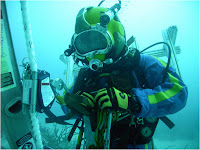 |
| Jessica Snyder NSBRI Intern - Class of 2010 |
After returning to Philadelphia from my summer at NASA Johnson Space Center (JSC), I visited my high school, Hammonton High School, to talk about the NSBRI Internship and space life sciences. My experience with NSBRI and JSC made me recognize two important lessons, both of which I wanted to share with students weighing various university studies and professions.
The first lesson is NASA is an incredible national asset. NASA carries people to space, shelters them in the International Space Station and photographs our galaxy. These are the impossible accomplishments of devoted, imaginative people who never stop learning. To spend a summer working alongside such people is a humbling and exciting prospect. NASA reaches across political and social divides to be a truly collaborative environment with partners in foreign governments, private industry and academia. Space exploration and manned space travel generates new scientific expertise and technology with real applications to human health and wellness here on Earth. Search and rescue technology, automation, remote medical treatment capabilities and imaging and sensing technology are critical to astronaut safety, and translate to better quality emergency care on Earth. NASA is a national initiative to be proud of, and we should feel encouraged to participate in its active research.
The second lesson from my summer is the value of a good mentor. Many new interdisciplinary research fields are beyond the scope of a conventional high school science class. It is my opinion, this type of cooperative research and exchange of expertise and perspective results in some of the most interesting work. It is the responsibility of researchers to further science and introduce the next generation to the value of their field of research. I wanted to invite other students to get involved and share their own questions and ideas. I think it is important that students realize opportunities like the NSBRI Summer Internship Program are available to experience scientific research, and the people who receive such awards are just like themselves. These awards are to introduce motivated students to hands-on lab work and relevant current research topics.
It was very rewarding to share my experience with my old teachers and their current students. I would encourage other interns to pursue similar opportunities to share. Students wanted to hear about space life sciences and had interesting questions about NASA. I believe the talk introduced the students to space life sciences in a new and inviting way. I hope the students feel encouraged to investigate and apply for such opportunities and consider a career in science or engineering.

